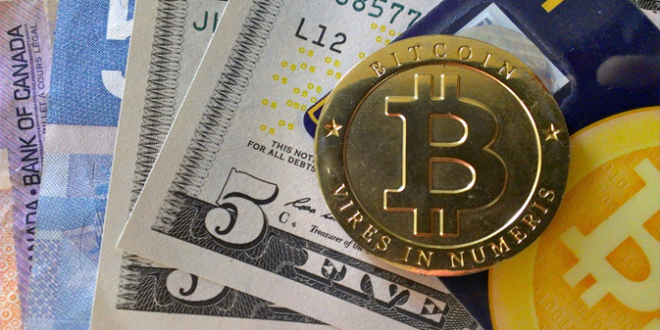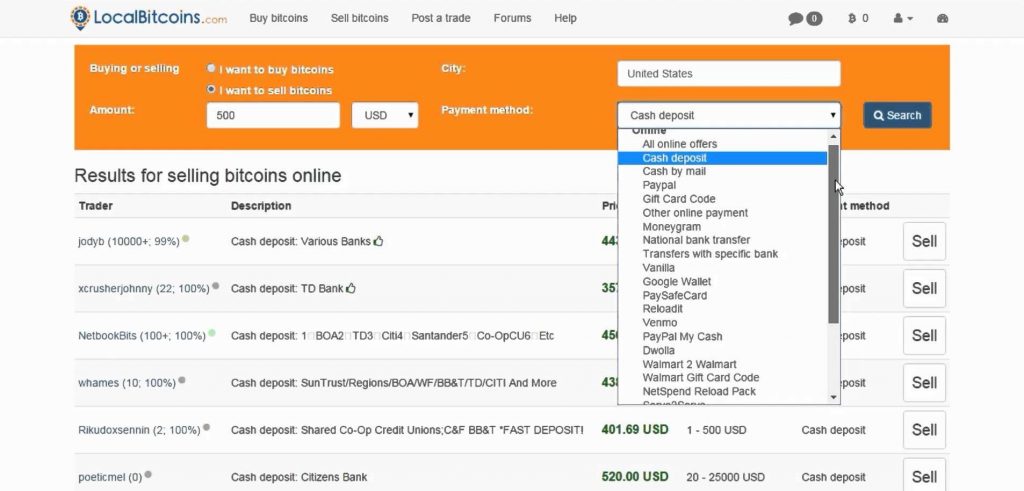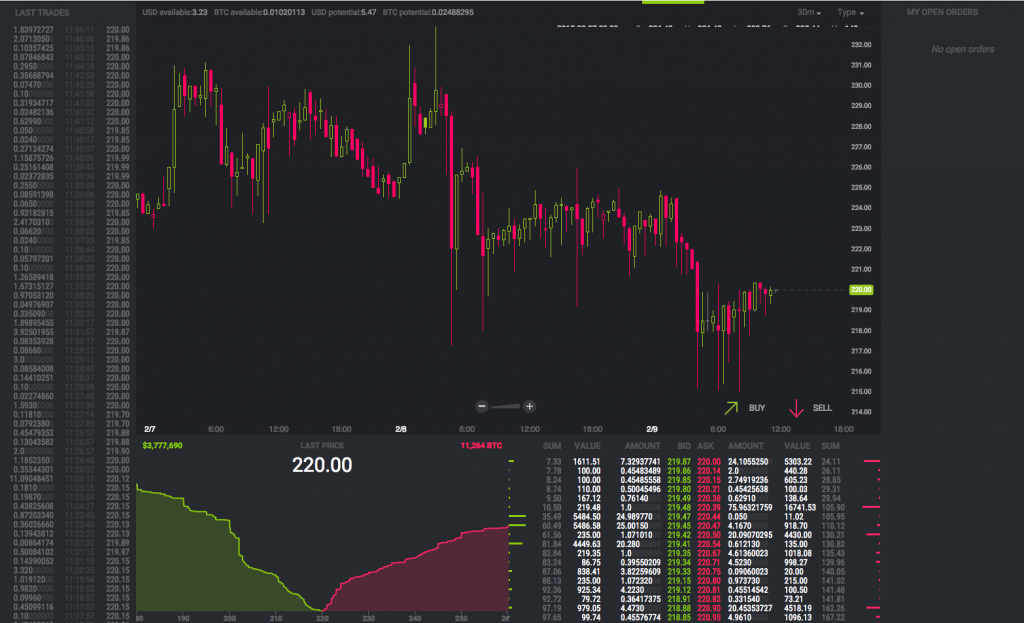If you intend to sell Bitcoins, you will have to decide which of the two possible methods is more suitable for you – whether to sell in person, or to sell on-line. Note that both alternatives have their pros and cons.
Selling in person
It is perhaps the easiest way to sell your coins. You just need to scan a QR code on the buyer’s smart phone and accept a cash payment. If you prefer this method of selling, then you will have to consider the following:
– First, decide what exchange rate works best for you. To determine a rate, you may use the current price of Bitcoin on a particular famous cryptocurrency exchange as a benchmark. Additionally, you may use mobile apps such as Zeroblock or BTCreport in order to calculate the exchange rate. It is also possible to add a small percentage on top of the calculated exchange rate as an ”anonymity premium”, or if you want to cover some costs.

– Second, do not overlook safety. It is best to arrange a meeting with a buyer in a public place. Also, make sure that you do not go alone. It is always wise to have somebody you trust by your side, especially when carrying a considerable amount of cash.
A good option to look for Bitcoin buyers in the area where you are currently located includes the use of LocalBitcoins.com. This website offers a reputational system that allows every seller to receive reviews from previous buyers. A seller who has proven trustworthy as a trade partner will be able to sell their Bitcoins with a premium attached. Another advantage of such a website is that no identity verification is required, unlike other places on the web. However, the risk associated with meeting in person someone you do not know still remains. Thus, you need to stick to general safety rules.
Selling on-line
Practice has shown that selling on-line is a more common way to exchange Bitcoins. There are three options you can choose from:
– First, trading directly with another person on the web through an intermediary site. In case you are located in the United Kingdom, you may use websites such as BitBargain UK and Bittylicious. If, on the other hand, you have a bank account in the United States, you may use services provided by Coinbase, Circle and LocalBitcoins.

Upon registration as a Bitcoin seller with such websites, you will be asked to verify your identity. Once the verification process is complete, you will be able to submit an offer, with which you indicate you are willing to sell Bitcoins. In case there is a buyer interested in your offer, you will be notified by the web service and, subsequently, you will be able to interact solely with that person. Eventually, you can finalize your trade through the website.
– Second, trading via on-line cryptocurrency exchanges that act as intermediaries and hold everybody’s money. Again, upon registration with a particular exchange, you will be asked to verify your identity. Once the process is complete, you will be able to submit your sell order, which includes the desired amount you are willing to sell, the type of digital currency (in this case, Bitcoin), as well as the desired price, for which you wish to sell a single unit of that currency. Once there is a buy order that matches your criteria, the trade will be finalized by the exchange and the digital currency will be credited to your account.
One possible drawback of using the services of a crypto exchange involves the sale of Bitcoin or another digital currency for conventional currency. In this case you will have to withdraw the fiat money to your bank. If the crypto exchange lacks liquidity at the moment you wish to complete your transaction, or if it has issues with the bank/s it works with, there may be a significant delay with the fund transfer to your account. If you are looking for crypto-to-fiat currency exchanges on-line, you may check Bitstamp, Kraken, Circle, or BTC-e.

There is another type of on-line exchanges, known as pure cryptocurrency exchanges, where you are enabled to transact Bitcoins for another digital currency. Examples of such exchanges include Cryptsy, CoinCorner among others.
What we should not forget is that some on-line exchanges will charge you fees for their service. For instance, BTC-e has a flat 0.2% charge, while fees at other exchanges usually vary.
We should also note that some exchanges may impose restrictions on the amount of coins you can store there. In any case, you should make sure you do not store your entire portfolio of coins on an exchange, as the latter is not immune to hacker attacks.
– Third, trading via peer-to-peer marketplaces. Websites such as Purse and Brawker act as intermediaries and provide their members with a platform, a Bitcoin wallet solution as well as escrow for transfers. Such marketplaces specialize in connecting two groups of individuals that have specific and complementary needs. On one hand, there are persons willing to use Bitcoin in order to purchase goods from websites, where cryptocurrencies are not yet directly accepted. On the other hand, there are those willing to acquire Bitcoin with the use of a debit or credit card. What peer-to-peer marketplaces do is connect individuals with matching criteria in order to provide goods at discount to the first group of people and sell Bitcoins to the second one.
 Let us consider the following example. User A submits a list of goods he/she is willing to purchase as well as the desired discount (say, 15%) to the peer-to-peer marketplace. User B owns a credit card and is willing to acquire Bitcoins that equal the value of User A’s purchases. Thus, User B agrees on the trade and, by using the peer-to-peer marketplace, he/she obtains the goods wanted and requests their delivery to User A’s address. Upon delivery, User A informs the marketplace, after which User B’s Bitcoins will be released from escrow and will settle into his/her Bitcoin wallet. Note that a small fee for the website and the agreed discount for User A will be deducted from User B’s account.
Let us consider the following example. User A submits a list of goods he/she is willing to purchase as well as the desired discount (say, 15%) to the peer-to-peer marketplace. User B owns a credit card and is willing to acquire Bitcoins that equal the value of User A’s purchases. Thus, User B agrees on the trade and, by using the peer-to-peer marketplace, he/she obtains the goods wanted and requests their delivery to User A’s address. Upon delivery, User A informs the marketplace, after which User B’s Bitcoins will be released from escrow and will settle into his/her Bitcoin wallet. Note that a small fee for the website and the agreed discount for User A will be deducted from User B’s account.
 The majority of Bitcoin markets usually follow strict Know Your Customer and Anti-Money Laundering policies. As a result, Bitcoin sellers are subject to thorough identity verification procedures, unlike Bitcoin buyers from whom very little proof of identity is usually required. Therefore, when you register as a seller for the first time with a particular website, you need to consider completing the identity verification process.
The majority of Bitcoin markets usually follow strict Know Your Customer and Anti-Money Laundering policies. As a result, Bitcoin sellers are subject to thorough identity verification procedures, unlike Bitcoin buyers from whom very little proof of identity is usually required. Therefore, when you register as a seller for the first time with a particular website, you need to consider completing the identity verification process.
There are Bitcoin markets that require uploaded scans of two utility bills featuring the name and the address of the seller as well as an ID photo (an image of their driving license or their passport). Other Bitcoin markets may even require a selfie displaying the seller’s ID photo as well as the name of the market written on a piece of paper.
In case you feel uneasy to provide personal data in such a way to untrusted and effectively unregulated business, then you should reconsider selling your coins on-line.